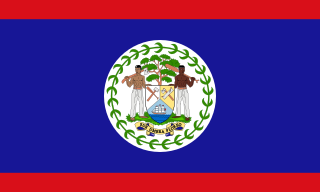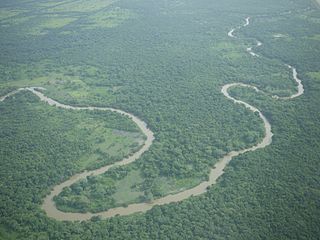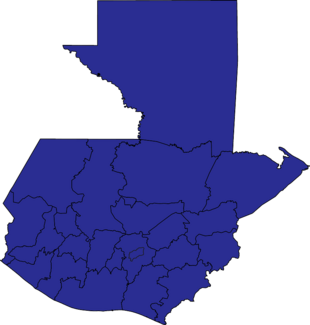Related Research Articles

Belize, formerly the British Honduras, is an independent and sovereign country located on the north eastern coast of Central America. Belize is bordered on the northwest by Mexico, on the east by the Caribbean Sea, and on the south and west by Guatemala. It has an area of 22,970 square kilometres (8,867 sq mi) and a population of 408,487 (2019). Its mainland is about 180 mi (290 km) long and 68 mi (110 km) wide. It has the lowest population and population density in Central America. The country's population growth rate of 1.87% per year is the second highest in the region and one of the highest in the Western Hemisphere.

Central America is a region found in the southern tip of North America and is sometimes defined as a subcontinent of the Americas. This region is bordered by Mexico to the north, Colombia to the southeast, the Caribbean Sea to the east and the Pacific Ocean to the west and south. Central America consists of seven countries: Belize, Costa Rica, El Salvador, Guatemala, Honduras, Nicaragua and Panama. The combined population of Central America is estimated to be between 41,739,000 and 42,688,190.

Belmopan is the capital city of Belize. Its population in 2010 was 16,451. Although the smallest capital city in the continental Americas by population, Belmopan is the third-largest settlement in Belize, behind Belize City and San Ignacio. Founded as a planned community in 1970, Belmopan is one of the newest national capital cities in the world. Since 2000 Belmopan has been one of two settlements in Belize to hold official city status, along with Belize City.

The Belize Defence Force (BDF) is the military of Belize, and is responsible for protecting the sovereignty of the country. The BDF is under the Ministry of Defence, which is currently headed by Hon. John Saldivar; the BDF itself is commanded by Brigadier General Steven Ortega. In 2012, the Belizean government spent about $17 million on the military, constituting 1.08% of the country's gross domestic product (GDP).

Belize City is the largest city in Belize and was once the capital of the former British Honduras. According to the 2010 census, Belize City has a population of 57,169 people in 16,162 households. It is at the mouth of the Haulover Creek, which is a tributary of the Belize River. The Belize River empties into the Caribbean Sea five miles from Belize City on the Philip Goldson Highway on the coast of the Caribbean. The city is the country's principal port and its financial and industrial hub. Cruise ships drop anchor outside the port and are tendered by local citizens. The city was almost entirely destroyed in 1961 when Hurricane Hattie swept ashore on October 31. It was the capital of British Honduras until the government was moved to the new capital of Belmopan in 1970.

The United Democratic Party (UDP) is one of the two major political parties in Belize. It is the ruling party, having won the 2008, 2012 and 2015 general elections. A centre-right conservative party, the UDP is led by Prime Minister of Belize Dean Barrow.

The Belize River runs 290 kilometres (180 mi) through the center of Belize. It drains more than one-quarter of the country as it winds along the northern edge of the Maya Mountains to the sea just north of Belize City. The Belize river valley is largely tropical rain forest.

The Mesoamerican Barrier Reef System (MBRS), also popularly known as the Great Mayan Reef or Great Maya Reef, is a marine region that stretches over 1,000 kilometres (620 mi) from Isla Contoy at the tip of the Yucatán Peninsula down to Belize, Guatemala and the Bay Islands of Honduras. The reef system includes various protected areas and parks including the Belize Barrier Reef, Arrecifes de Cozumel National Park, Hol Chan Marine Reserve (Belize), Sian Ka'an biosphere reserve, and the Cayos Cochinos Marine Park. Belize's coastline, including the Belize Barrier Reef, is home to approximately 80% of the Mesoamerican Barrier Reef System. The Belize Barrier Reef is the largest barrier reef in the northern hemisphere and the second largest barrier reef in the world. The Belize Barrier Reef and Belize's three offshore atolls, several hundred sand cays, mangrove forests, coastal lagoons and estuaries—collectively termed, the Belize Barrier Reef Reserve System—has been designated a World Heritage Site by UNESCO (1996).

The House of Representatives of Belize is one of two chambers of the National Assembly, the other being the Senate. It was created under the 1981 constitution. Members are commonly called "Area Representatives."
Belizean municipal elections, 1993–1994 was a series of municipal elections held in Belize within a period of twelve months and sandwiching a general election.

Since declaring independence in 1981, Belize has enacted many environmental protection laws aimed at the preservation of the country's natural and cultural heritage, as well as its wealth of natural resources. These acts have established a number of different types of protected areas, with each category having its own set of regulations dictating public access, resource extraction, land use and ownership.

Belizean passports are issued to Belizean citizens to travel outside Belize. The passport is a Caricom passport as Belize is a member of the Caribbean Community.

Tourism in Belize has grown considerably recently, and it is now the second largest industry in the nation. Belizean Prime Minister Dean Barrow has stated his intention to use tourism to combat poverty throughout the country. The growth in tourism has positively affected the agricultural, commercial, and finance industries, as well as the construction industry. The results for Belize's tourism-driven economy have been significant, with the nation welcoming almost one million tourists in a calendar year for the first time in its history in 2012.

Belize has a small, essentially private enterprise economy that is based primarily on agriculture, tourism, and services. The cultivation of newly discovered oil in the town of Spanish Lookout has presented new prospects and problems for this developing nation. Belize's primary exports are citrus, sugar, and bananas. Belize's trade deficit has been growing, mostly as a result of low export prices for sugar and bananas.

Wilfred Peter "Sedi" Elrington is a Belizean politician who has been the Minister of Foreign Affairs of Belize since 2008.
Karl Heusner Memorial Hospital is the main public hospital in Belize City, Belize. It functions as both the national referral hospital, and the district hospital for Belize District. It is located on Princess Margaret Drive, next to the offices of the Belize Social Security Board. It is publicly owned and operated, and is the main hospital in the area. As the hospital notes: "The KHMH has a capacity of 134 beds, and boast three surgical suits as well as two labor and delivery suits. A 24/7 stat lab, weekend pharmacy services, and range of over 25 specialists make the KHMH the place where, increasingly, more and more Belizeans turn to for emergency and medical care. Specialist clinics are held weekdays; additionally, private services are offered, allowing KHMH patients more options even within the parameter of being a public institution." Within the city there are seven other public hospitals, including three regional hospitals.
Water resources management in Belize is carried out by the Water and Sewerage Authority (WASA) in most cases. One of the primary challenges the country is facing with regard to water resources management, however, is the lack of coordinated and comprehensive policies and institutions. Furthermore, there are various areas of water management that are not well addressed at all such as groundwater data and provision of supply. Data on irrigation and drainage is not adequately available either. Demand on water resources is growing as the population increases, new economic opportunities are created, and the agriculture sector expands. This increased demand is placing new threats on the quality and quantity of freshwater resources. Other constant challenge for management entities are the constant threat of floods from tropical storms and hurricanes. The Belize National Emergency Management Organization (NEMO) is charged with flood management as they occur but it is unclear what institution has responsibility for stormwater infrastructures.

Visitors to Belize require a visa unless they come from one of the visa-exempt countries. All visitors are required to have sufficient funds, US$75 per day, and documents required for their next destination.
The use of cannabis in Belize is common and largely tolerated; however, possession can result in fines or imprisonment. Possession or use of 10 grams or less on private premises was decriminalized in November 2017.

A referendum on the territorial dispute with Belize was held in Guatemala on Sunday April 15, 2018. Voters were asked whether the Guatemalan government should request the International Court of Justice to finally resolve the territorial dispute, as part of a commitment signed in December 2008 between Guatemala and Belize. Guatemalan Vice President, Jafeth Cabrera, stated that Belize would hold their referendum in response in May 2018, but Belize released a statement denying this, stating rather that they will hold the referendum after the re-registration process has occurred to ensure an accurate and fair vote.
References
- ↑ "Diocesan web site". Archived from the original on 2015-04-19. Retrieved 2015-04-08.
- ↑ "ABCD: a basic church dictionary" Meakin, T: Norwich, Canterbury Press, 2001 ISBN 978-1-85311-420-5
| This Belize-related article is a stub. You can help Wikipedia by expanding it. |